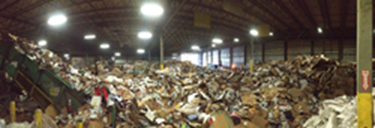Miller Recycling Helps Answer The Questions - If Recycling Is The 'Right Thing To Do' Why Is It Sometimes Difficult Or Costly?

It takes more energy to collect recyclables than its worth! This is a common statement regarding the efforts required to properly recycle.
Mansfield, MA (PRWEB) - Miller Recycling Corporation, a 70+ year old company, would like to attempt to address some frequently asked questions and statements regarding recycling.
1. It takes more energy to collect recyclables than its worth!
This is a common statement regarding the efforts required to properly recycle. Unfortunately many just focus on the potential monetary return for their efforts and not the environmental benefits.
For example, the energy savings from making aluminum cans from recycled rather than raw material consumes 95% less energy. Also the energy savings from recycling one ton of paper is enough to power an average household for up to six months, saves 7,000 gallons of water and keeps 600 pounds of air pollutants out of the air.
2. Why can’t we get paid for our recyclable material – why does is “cost” to recycle?
Recycling is one option for managing waste, and waste collection, handling, processing, and recycling cost money. When a material enters the waste stream, whether trash, recycling, compost or household hazardous waste, there is an associated cost to handle this material. The revenue or value generated through recycling helps cover costs such as transportation, labor, equipment and maintenance, state and town permits, taxes, electricity, and more.
3. Throwing all recyclables in one bin is the best way to recycle, as it maximizes the amount of material collected.
Not True. “Single Stream Recycling”, or the practice of combining all recyclables in one bin has grown in popularity in the last 10 years. It is proposed to increase the amount of material recycled, be done at a lower cost, reduce the number of trucks and minimize the amount of “trash”, or solid waste disposed of.
What is not stated is the fact that commingled materials are very costly to separate. Various types of contaminates need to be hand sorted, and broken glass is virtually impossible to remove from paper. Up to 30% of material collected cannot be recycled due to this contamination – and must be disposed of. (Unfortunately the “value” of this material does not justify the expense required to clean it to the point where it can be recycled.) Landfilling is the best and lowest cost option.
From recycling bin to truck, through the recycling facility to the landfill – it can be a long, and expensive trip!
This type of recycling may look preferable as presented – but rarely does it take into consideration the cost and expense incurred by contamination, material rejection, equipment downtime – and disposal costs incurred by the various recyclable consumers, including paper mills.
About the company:
Miller Recycling Corporation is in the business of finding solutions to recycling and solid waste related problems. Our goal is to provide answers, through waste reduction, recycling, and implementation of efficient processing systems.
With an ongoing focus on sustainability,Miller Recycling installed a 1200 panel SOLAR array at our processing facility and main office in 2012. To date this system has saved our company the equivalent of 249 barrels of oil and generated a total of 423,609 KWH of electricity.
For more information, visit http://www.millerrecycling.com
Northeast Data Destruction, our NAID “AAA” Certified confidential shredding division, will securely process all your sensitive documents, files, media, hard drives, tapes, CD’s, off spec products and storage components. For over 70 years Miller Recycling has helped find solutions to recycling and solid waste related problems. We provide answers, through waste reduction, recycling, and implementation of efficient processing systems. Miller Recycling Corporation also assists with all electronics, paper, plastics, and metals recycling requirements.
Source: PRWeb
View original release here: http://www.prweb.com/releases/recycling/14/prweb11637235.htm
